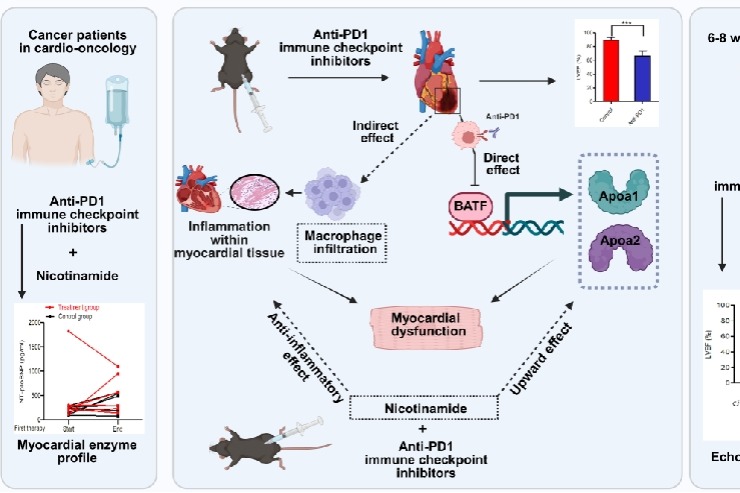LANZHOU — Chinese researchers have revealed the heart-protective effect of nicotinamide — a derivative of B vitamins — in exploring the mechanisms of related cardiotoxicity in tumor treatment, according to Lanzhou University.
Their study uncovered the mechanisms by which immune checkpoint inhibitors induce early cardiotoxicity, and developed a new, safe and effective approach to preventing and treating cardiotoxicity in patients receiving tumor immunotherapy, the university said.
Conducted by researchers at the Lanzhou University First Hospital, the study has been published in the Science China: Life Sciences journal.
Having the potential to result in death, cardiac immune-related adverse events associated with anti-programmed cell death protein 1 (PD-1), which is a type of immune checkpoint inhibitor, are becoming a concern. This study aimed to explore effective means of early warning and prevention, according to Bai Ming, a professor at the Lanzhou University First Hospital and the study”s leader.
The team first investigated the role of PD-1 in the early stages of cardiotoxicity and its underlying mechanisms by combining clinical data with experiments.
Then, the researchers conducted randomized controlled trials to verify the preventive effect of nicotinamide against early cardiotoxicity related to PD-1.
Their findings showed that nicotinamide demonstrates potential in preventing cardiotoxicity in patients receiving anti-PD-1 cancer treatment, according to Bai.
The clinical transformation of this research also confirmed that nicotinamide — a drug commonly used in clinical practice — is suitable for rapid transformation and application.
Nicotinamide therapy focuses on “early” cardiotoxicity, making it possible to prevent and treat cardiotoxicity. Therefore, this therapy highlights the concept of synergistic treatment that ensures anti-tumor efficacy while protecting heart functions, per the study.
“The findings of the study contribute to a better understanding of cardiac anti-PD-1 immune-related adverse events. They show that nicotinamide could be a promising preventive strategy in the early stages of cardiotoxicity, which is associated with the use of such checkpoint inhibitors in cancer treatment,” Bai said.
“Therefore, this study sheds new light on the well-considered safety issues in tumor treatment,” he added.
